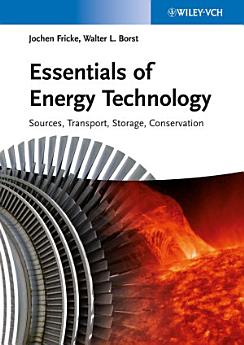Essentials of Energy Technology: Sources, Transport, Storage, Conservation
About this ebook
Energy makes our lives comfortable, and the existence of amenities such as heaters, cars, warm water, household appliances and electrical light is characteristic for a developed economy. Supplying the industrial or individual energy consumer with energy 24 hours a day is a non-trivial challenge, especially in times where the energy is coming from very diverse resources such as oil, gas, nuclear fuels, wind, sun, or waves.
This book gives physics, chemistry, engineering, and materials science students insights in the basics of energy and energy technology. It was developed along a successful course for advanced bachelor or graduate students and is written in a didactic style. The problems and solutions at the end of each chapter are ideal for exams and make self-study easy. Topics covered include energy from fossil and nuclear fuels, renewable sources, energy transport, storage, and conservation.
Ratings and reviews
- Flag inappropriate
About the author
Walter Borst is Professor Emeritus of Physics at Texas Tech University, Lubbock, where he still teaches. He joined the University as department chairman in 1984. Before coming to Texas he was Professor of Physics at Southern Illinois University, Carbondale. In Illinois he also served as chairman of the advisory board of the Illinois Energy Resources Commission. Borst received his Ph. D. in Physics from the University of California at Berkeley in 1968 with a specialty in atomic and molecular physics. He then went to the University of Pittsburgh as a postdoctoral fellow. Before coming to the United States he received his Diplom in Physik from the University of Tubingen, Germany, in nuclear physics. His main research has been in atomic collisions and time-resolved laser-induced fluorescence for materials characterization, and in renewable energy, especially solar heat collectors and long-term solar heat storage. During his professional career Borst served in a variety of scientific organizations. He recently received the Distinguished Service Award from the Texas Section of the American Physical Society.





